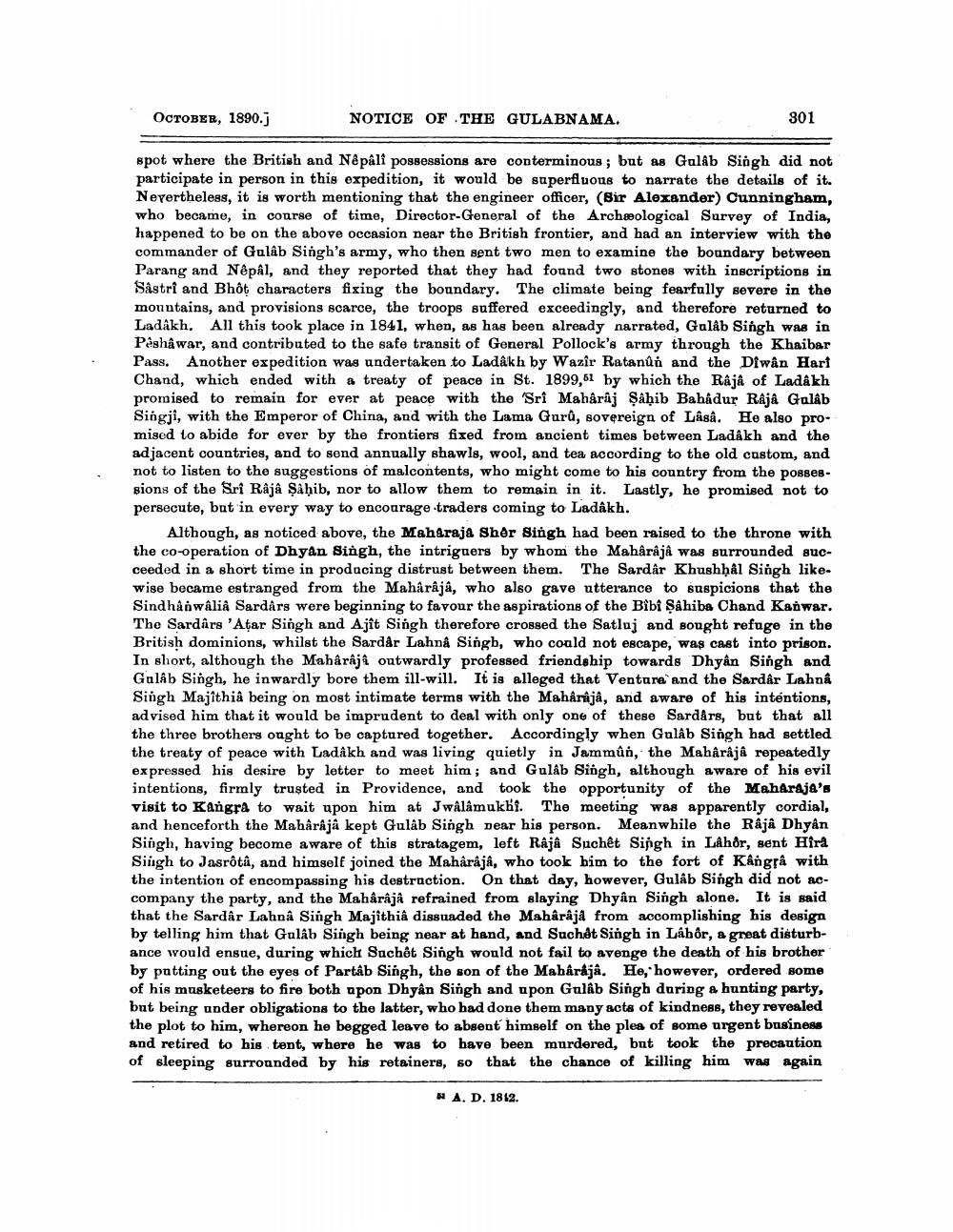________________
OCTOBER, 1890.j
NOTICE OF THE GULABNAMA.
301
spot where the British and Nepali possessions are conterminous; but as Galáb Singh did not participate in person in this expedition, it would be superfluous to narrate the details of it. Nevertheless, it is worth mentioning that the engineer officer, (Bir Alexander) Cunningham, who became, in course of time, Director-General of the Archeological Survey of India, happened to be on the above occasion near the British frontier, and had an interview with the commander of Gulab Singh's army, who then sent two men to examine the boundary between Parang and Népal, and they reported that they had found two stones with inscriptions in Sastri and Bhót characters fixing the boundary. The climate being fearfully severe in the mountains, and provisions scarce, the troops suffered exceedingly, and therefore returned to Ladakh. All this took place in 1841, when, as has been already narrated, Galáb Singh was in Peshawar, and contributed to the safe transit of General Pollock's army through the Khaibar Pass. Another expedition was undertaken to Ladakh by Wazir Ratanun and the Diwan Hart Chand, which ended with a treaty of peace in St. 1899,61 by which the Raja of Ladakh promised to remain for ever at peace with the 'Sri Maharaj Şahib Bahadur Râjâ Galáb Singji, with the Emperor of China, and with the Lama Gurû, sovereign of Låså. He also promised to abide for ever by the frontiers fixed from ancient times between Ladakh and the adjacent countries, and to send annually shawls, wool, and tea according to the old custom, and not to listen to the suggestions of malcontents, who might come to his country from the possessions of the Sri Rajâ Şahib, nor to allow them to remain in it. Lastly, he promised not to persecute, but in every way to encourage traders coming to Ladakh.
Although, as noticed above, the Maharaja Sher Singh had been raised to the throne with the co-operation of Dhyan Singh, the intriguers by whom the Maharaja was surrounded aucceeded in a short time in producing distrust between them. The Sardar Khushhal Singh likewise became estranged from the Mahârâjâ, who also gave utterance to suspicions that the Sindhånwâlià Sardárs were beginning to favour the aspirations of the Bibi Şahiba Chand Kanwar. The Sardars 'Atar Singh and Ajit Singh therefore crossed the Satluj and sought refuge in the British dominions, whilst the Sardar Lahna Singh, who could not escape, was cast into prison. In short, although the Maharaja outwardly professed friendship towards Dhyan Singh and Gulab Singh, he inwardly bore them ill-will. It is alleged that Venture and the Sardar Lahna Singh Majithia being on most intimate terms with the Maharaja, and aware of his intentions, advised him that it would be imprudent to deal with only one of these Sardars, but that all the three brothers ought to be captured together. Accordingly when Gulab Singh had settled the treaty of peace with Ladakh and was living quietly in Jammun, the MahârâjA repeatedly expressed his desire by letter to meet him; and Gulab Singh, although aware of his evil intentions, firmly trusted in Providence, and took the opportunity of the Maharaja's visit to Kangra to wait upon him at Jwalamukhi. The meeting was apparently cordial, and henceforth the Mahârâjâ kept Gulab Singh Dear his person. Meanwhile the Raja Dhyan Singh, having become aware of this stratagem, left Raja Suchêt Singh in LAhôr, sent Hira Singh to Jasrôtâ, and himself joined the Mahârâjâ, who took him to the fort of Kangra with the intention of encompassing his destruction. On that day, however, Gulab Singh did not accompany the party, and the Mahârâjâ refrained from slaying Dhyan Singh alone. It is said that the Sardâr Lahna Singh Majithiâ dissuaded the Maharaja from accomplishing his design by telling him that Gulab Singh being near at hand, and Suchet Singh in Lábôr, a great disturbance would ensue, during which Sachêt Singh wonld not fail to avenge the death of his brother by patting out the eyes of Partab Singh, the son of the Mahârájá. He, however, ordered some of his musketeers to fire both apon Dhyan Singh and upon Gulab Singh during a hunting party, but being ander obligations to the latter, who had done them many acts of kindness, they revealed the plot to him, whereon he begged leave to absent himself on the plea of some urgent business and retired to his tent, where he was to have been murdered, but took the precaution of sleeping surrounded by his retainers, so that the chance of killing him was again
NA. D. 1812.




